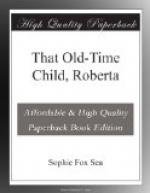“Mis July, dat deviles hoss dun played me dat same trick ergin. He dun lade down in de mud en roll ober en ober. ’T will take me clar up ter de time to start ter chech ter git dat mud orf him, en hard wurk at dat. Dat hoss knows ez well when Sad-day night comes ez you duz. Jes’ de way he dun las’ week when I hetch him in de plow: lay down en groan lak he sick enuff ter die, ter keep fum worken’; en half hour arfter I turn him luse frolerken lak er colt—jes’ kicken’ up his heels, I kin tell you.”
“Why not drive some of the others, Uncle Squire, so you can come in to prayers?”
“I dun turn em all out, en dey’s gorn, de Lord unly knows whar. If I’d unly know’d it en time now. But I’ll show ’im—I’ll show ’im. I gwiner be mity solid wid ’im, en mebbe heel larn arfter while dat he aint his own master.”
At other times it was a mule.
“Mis July, dat mule dun tore down dat rock fence ergin. I bounter fix it or de stock will git out en go orf, you knows dat ez well az I duz. Dat mule’s yours, en you kin do what you please wid him, but ef he ’longter me I’d sell him de fus chance I git. Dat mule nuff ter mek er man strike hees gran-daddy.”
Now, it was a well-known fact that Mrs. Marsden had tried several times to sell the mule, and old Squire had always declared “the mule was the most valuable animal on the place, and it was just giving him away to sell him at the price offered.”
Polly was Squire’s granddaughter, and inherited his want of reverence for sacred things. She was very, very trying, especially on one occasion I will tell you about.
Roberta gathered the children together, took her Catechism and primer, and went down to the summer-house. She noticed that Polly’s expression was sulky, and that she was rolling her eyes at Dilsy. But Polly was always tormenting Dilsy. Dilsy was a little hunchback negro, that everybody but Polly felt sorry for and tried to turn the soft side of life to.
Roberta was not much discouraged by Polly’s actions, still she knew it was a great deal pleasanter to teach her when she was in a good humor, and concluded to resort to a strategy to mollify her.
The child was a close observer of nature, and knew how indispensable to germinate seed was a mellow, rightly prepared soil, and what service sunshine and timely rainfalls were to growing crops. So she intuitively drew an analogy in her childish way between the soil the plow-man turns over and the human heart.
Now, if there was one thing that Polly delighted in more than another it was the game of “Chick-a-mie, chick-a-mie, craney-crow.”
So the children joined hands and moved around and around in a circle, singing:
“Chick-a-mie, chick-a-mie,
craney-crow,
Went to the well to wash my
toe,
When I got back my chickens
was gone.
What o’clock is it,
old Buzzard?”
Then they would fly around looking for the chickens. At least all of them but Polly would. Polly always took the part of old Buzzard, so she could flop down in Dilsy’s seat, although she knew she would have to get right up.




